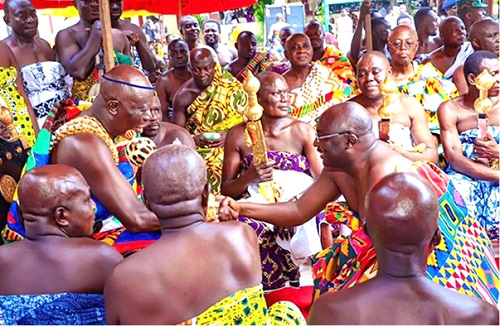
Public protocols and my waist pains
I wonder when I will get used to public protocols in customary settings: standing on the approach of a big chief; bowing to greet at 90 degrees; kneeling before the Most High, and all other postures that simply mean, ‘you are a small fry in front of a big man.’ In my peculiar case, let me add ‘adjusting your cloth to say Happy Birthday, Otumfuo.’
In one such effort, I became an object of public ridicule. 1999, at a farewell reception held at Manhyia by Otumfuo Osei Tutu for Mr. Kojo Yankah, then outgoing Ashanti Regional Minister; I had worn my ‘Christmas’ cloth, set to serially shake hands with chiefs and elders lined up at the reception grounds. I did not quite reach the third in-line, when I was reprimanded to retreat and reverse my cloth wear before further damage. The problem? Walking with a swagger to the event, I had completely forgotten to leave behind my left-hand ways, and had worn my cloth as a ‘leftee’ exposing my left shoulder. Within seconds, I was called to order and had to comply, ending up with the clumsy looks of an Achimota boy in cloth wear. That explains the nickname Nana Otuo
Serebuor, Paramount Chief of Asante Juaben, instantly gave me: ‘Forced Landing.’
Looking at one current presidential candidate, I marvel at the physical effort involved in his extraordinarily low bow greeting chiefs, and keep wondering if his lower back column is endowed with any bones. If so, he should accept my congratulations, but need not mock at rival competitors who could bow to chiefs in courtesy, but struggle to rise. The Walewale candidate will grow up one day, and join the club called Waist Pains! A deep bow of course signals deep respect, but let the ‘Bawu Bow’ continue even after power has been won. The culture of left-hand waves while in power, must stop.
As for the ceremonial stand-up to authority, it begins with the ‘obeisance’ routine as soon as teacher steps the classroom:
‘Class stand! Obeisance,’ says the class prefect.
‘Good morning teacher, good morning friends.’ A brief stand-up salute is the norm, and reminds Teacher of their authority, and respect they command. Throughout primary school in Ehyiamu and Osenase, no pupil dared to default in those courtesies: the cane teacher wielded was enough deterrent.
Then come frequent stand-ups at church service which are procedural and signal veneration unto the Supreme Being. But this poses knee challenges if extended to a marathon stint, particularly on an empty stomach. Fatigue and hunger may set in should Pastor insist on all 8 stanzas of the Charles Wesley Hymn, dispensing no mercies upon any waist pains within. In churches where hymns are slow and dragged, you pray you survive through the last stanza. But Pastor noticing widespread unease from the slow pace, may quickly intervene to your rescue: ‘we shall now sit and sing the last two verses;’ which often triggers a collective sigh of relief almost followed by applause.
The issue with churches is the blasphemy implied if you should be seen dragging your feet or grumbling, when asked to stand in the name of the Lord. Pardonable exceptions are new arrivals; but often caught on the spot are truants and chronic absentees who have forgotten church routines, and oddly remain seated when everyone is on their feet, and keep standing when all else are seated. That anomaly turns eyes in your direction. But it is also an act of self-betrayal, and a reminder for the ‘culprit’ to see Pastor after church, and quickly repair his battered image in the tithe register.
The climax of all this is the cultural mandate to stand, not for the Supreme Being, but his mortal counterpart on earth. At funerals, woe betide you if the MC announces the arrival of a big chief and his retinue, and urges the entire gathering to be upstanding as he goes round greeting. Knowing that chiefs do not hasten to greet, but walk gently and in majesty, please reach for your Panadol medication if you have chronic waist issues. Smart mourners hesitate to rise until the great chief has come in close proximity to their section; they then stampede to their feet, straighten cloth wear and respond to royal greetings, internalizing their fury.
There was one incident, however, I can never forget at a big funeral in our humble Agona neighborhood. May 2016. Being an important funeral, the Yankah brothers were in full attendance seated on the front row at the western wing, our better halves seated behind us. Having been upstanding on the arrival of a few sub chiefs, one other arrival found us dragging our feet. Consultations started among us. Is that notorious man also a chief? After further mouth-to-ear chat, our leader directed we should remain seated, for that man whom he knew very well, was a fake chieftain. Thus while the entire congregation was upstanding the rebels remained seated, as the ‘chief’ did his rounds with hand waves. Within yards of our space, the fake chief hesitated and grudgingly bowed to us, as he hobbled to his seat somehow deflated.
In Ghana’s history, there are a few known protocol breaches denigrating our Heads of State or national anthem in public. One was between John Ndebugre and Jerry Rawlings in Bawku December 1991; and a few have happened in recent times.
When such breaches occur, may our Leaders not be provoked to overreact in public; they should continue their rounds ignoring the culprit; or better still, peer at the culprit with an ‘evil’ eye.
